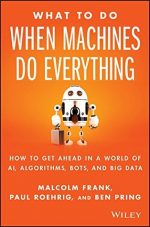Machines are Taking Over: Digital Transformation
Display Transcript
Like it or not, the digital age is at our front door and you can either find ways to adapt or be lost in the new wave of technology. Companies such as Uber, Waze, Netflix, Google, and Amazon have been using technology known as AI for years now, and soon enough many more companies will follow.
What is AI you might ask? AI is short for artificial intelligence which according to Malcolm Frank, Paul Roehrig, and Ben Pring, authors or What to Do When Machines Do Everything is a combination of algorithms, data sets, hardware, and human input that can essentially “learn” over time. Google uses this when they attempt to finish your search result, Netflix showcases this when giving you recommendations on what to watch next, and even Uber uses this technology when they send a driver to your location.
Artificial Intelligence is all around us already and soon, some speculate that if it costs more than $5 and cannot be eaten, then it will be automated.
With this rise of automation, the questions arise whether or not jobs will be lost and more importantly, will my job be automated? Before I answer that question let me make a very important distinction between jobs and tasks. A job requires knowledge and thought about how to do specific actions such as being a doctor and knowing how to perform a surgery and use emotional intelligence to deliver news to patients and their families in a way that is as comforting as possible. A task is an action that requires little to no thought about what is being done and usually consists of minimal steps, possibly one of two. An example of this would be a single individual on an assembly line.
Now back to the initial question that you have been waiting for. Is my job safe from automation? Well, if you have a job as defined by what was previously mentioned, then Artificial Intelligence will significantly improve your job and your ability to achieve high results. On the other hand, unfortunately, if you are getting paid to do a specific task, then most likely your job will be automated.
This may seem like a terrible thing, and for many people, it will be devastating however if you have a growth mindset that can continue to adapt to the obstacles ahead of you, then this should only be a bump in the road. With the implementation of Artificial Intelligence becoming more widespread, that means that there will be new jobs that emerge that have never existed before.
Some other concerns that deal with AI come from hollywood blockbusters such as Terminator or iRobot and that is the fear that AI will be able to think for itself and reprogram itself to always be 10 steps ahead of humans at all times. There is a name for this type of AI, it is known as Super AI. This type of artificial intelligence is only one of the three different kinds and for those of you who fear that this will happen, let me read you a quote from the book, “Worrying about general or super AI is like worrying about overpopulation on Mars before we’ve even set foot on it.” In the quote they mention general AI which is a type of artificial intelligence capable of doing complex or multi step tasks. When being discussed, most of the time people are talking about Narrow AI. This type of artificial intelligence is specifically designed for one task and this will be the type of AI that replaces factory work.
Although the future is always uncertain, it is safe to say that this digital age will arrive and the best way to prepare yourself for what the future holds, is to have a growth mindset. A mindset that allows you to notice the changes going on around you, and allows you to also change as a result. For the people listening and are interested in learning more about how they can better prepare themselves for the future, there are plenty of resources out there and I recommend checking out Listen4Insight.com. For everybody who wants to get ahead and learn more about this Digital Age, I think that you are on the right track. For those of you who choose not to adapt as the world around you does, I wish you luck.
 What To Do When Machines Do Everything, written by authors Malcolm Frank, Paul Roehrig, and Ben Pring, is a pragmatic approach to the way that digital transformation, automation, and artificial intelligence will possibly impact the fast approaching reality, known as the future. They give way to many different possibilities that could be foreseen happening and how these different possibilities will impact the workforce of tomorrow. Resiliency is a very prevalent topic within the book as they encourage readers to take action as soon as possible, for this will be the greatest chance the have to succeed.
What To Do When Machines Do Everything, written by authors Malcolm Frank, Paul Roehrig, and Ben Pring, is a pragmatic approach to the way that digital transformation, automation, and artificial intelligence will possibly impact the fast approaching reality, known as the future. They give way to many different possibilities that could be foreseen happening and how these different possibilities will impact the workforce of tomorrow. Resiliency is a very prevalent topic within the book as they encourage readers to take action as soon as possible, for this will be the greatest chance the have to succeed.
This book allowed me to see what the future could hold, and although there is nothing definite in this world, having a guide or some type of idea of how things might be, made me want to take action immediately. Whether or not anything that they say in the book really happens, one thing for certain is that the world is going to change and it is important that I adapt as well as inform and encourage my peers to do the same. Staying on top of the new technologies will help everybody because there will be no need to “catch up” to a rapid wave of growth. By creating a plan for how to adapt to certain obstacles and seeing problems as possibilities rather than dead-ends, will allow for a greater chance for success. Getting discouraged and refusing to change will only ensure that I remain stagnant. To those who are interested in learning about how their industry will be affected by the digital era, What To Do When Machines Do Everything is a great read, and I highly recommend giving it a look.

Mitchell Georgia-Hoard
Mechanical Engineering major at Miami University
View Biography
Mitchell Georgia Hoard is currently a Mechanical Engineering major at Miami University, graduating in May of 2020 with intentions of going to law school post-graduation to follow his dreams of becoming a Patent Attorney. Through the Lockheed Martin Leadership Institute, he is practicing and perfecting his soft skills such a communication, personal development, and strategic analysis. Once a shy character, Mitchell has truly come out of his shell and developed his confidence through the leadership institute which he then applies to the rest of his life. Although he has never held any leadership positions in college, he believes that a title does not make one a leader, as he knows the difference between management and leadership. Through his actions on a daily basis, he exemplifies the true definition of being a leader by leading by example.
This year in the Leadership Institute, Mitchell is part of the Writing and Documentations Team which creates pieces that tell our audience about the idea of digital transformation and artificial intelligence. He has taken on the task of creating a series of articles that tells the story of how the project has evolved through the perspective of a student in hopes to reach out to his peers and inform them about the upcoming digital era. In addition to the series, he also has taken on the task to write a weekly newsletter to outline the progress that has been made as well as major topics or ideas that may have come up within the week. Once the the Listen4Insight website has launched, the Mitchell, and the other members of the writing team will review and edit every text entry that is added to the website. He enjoys technical writing and hopes that this experience that he gains through the institute will prepare him for his future as a litigator.
